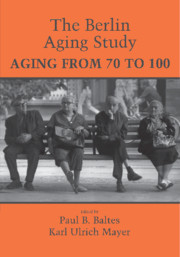Book contents
- Frontmatter
- Contents
- Acknowledgments
- Introduction
- Part A Theoretical Orientations and Methods
- Part B Major Results from the Four Research Units
- Part C Interdisciplinary Findings
- 9 Men and Women in the Berlin Aging Study
- 10 Social Relationships in Old Age
- 11 Self, Personality, and Life Regulation: Facets of Psychological Resilience in Old Age
- 12 Limits and Potentials of Intellectual Functioning in Old Age
- 13 Sensory Systems in Old Age
- 14 Everyday Competence in Old and Very Old Age: Theoretical Considerations and Empirical Findings
- 15 On the Significance of Morbidity and Disability in Old Age
- 16 The Utilization of Medical and Nursing Care in Old Age
- 17 Sources of Well-Being in Very Old Age
- Part D Overview and Outlook
- Notes on Contributors
- Abbreviations
- Author Index
- Subject Index
17 - Sources of Well-Being in Very Old Age
Published online by Cambridge University Press: 06 December 2010
- Frontmatter
- Contents
- Acknowledgments
- Introduction
- Part A Theoretical Orientations and Methods
- Part B Major Results from the Four Research Units
- Part C Interdisciplinary Findings
- 9 Men and Women in the Berlin Aging Study
- 10 Social Relationships in Old Age
- 11 Self, Personality, and Life Regulation: Facets of Psychological Resilience in Old Age
- 12 Limits and Potentials of Intellectual Functioning in Old Age
- 13 Sensory Systems in Old Age
- 14 Everyday Competence in Old and Very Old Age: Theoretical Considerations and Empirical Findings
- 15 On the Significance of Morbidity and Disability in Old Age
- 16 The Utilization of Medical and Nursing Care in Old Age
- 17 Sources of Well-Being in Very Old Age
- Part D Overview and Outlook
- Notes on Contributors
- Abbreviations
- Author Index
- Subject Index
Summary
In this chapter, we examine ideas about the sources and processes of well-being in the context of a model derived from the work of Campbell, Converse, and Rodgers (1976). The model allows an integration of medical, sociological, and psychological perspectives. We describe the levels of well-being reported by the participants in the first cross-sectional measurement phase of the Berlin Aging Study (BASE), and examine the extent to which objective and subjective indicators of specific life domains predict overall individual well-being. Results from this investigation were multifaceted. The majority of participants reported satisfaction with their present life conditions. However, older women, individuals aged 85 and over, and persons living in institutions reported less frequent experience of positive emotions, an important component of well-being. Path analysis indicated that subjective domain evaluations (especially subjective health) were stronger predictors of subjective well-being than were the objective measures of domain status. This finding is consistent with the theoretical framework of Campbell et al. (1976). It suggests that the self-regulation processes that contribute to adaptation to changing life conditions (e.g., changes in aspiration levels and comparison targets) operate effectively in old age. We argue, however, that the cumulative challenges and losses of very old age could tap the limits of these adaptive processes. For this reason, it is essential to implement measures supportive of well-being in late adulthood. […]
- Type
- Chapter
- Information
- The Berlin Aging StudyAging from 70 to 100, pp. 450 - 472Publisher: Cambridge University PressPrint publication year: 1998
- 13
- Cited by

